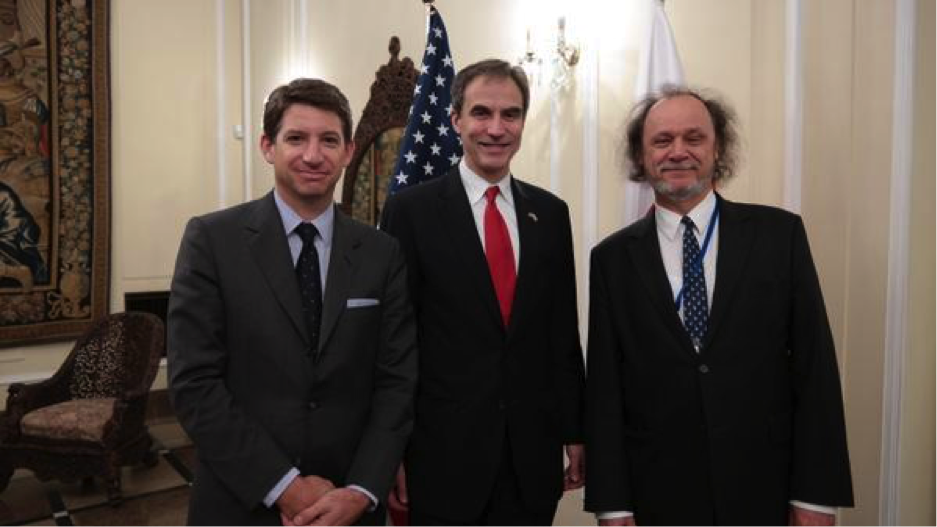Hundreds of public and private sector experts gathered in Warsaw, Poland on October 5-9 to advance innovation ties between Poland and the United States as part of the US-Poland Innovation Council (PLUS-IP), a public-private partnership that connects government, business, and academia in Poland with their US counterparts in similar areas of expertise and economic development to promote access to capital and more rapid and effective commercialization of technology.
American Councils for International Education and Polish Clusters co-lead PLUS-IP's efforts to promote best practices in regional clusters and regional economic development. Dr. W 'odzis 'aw Duch, Undersecretary of Ministry of Science and Higher Education, and Mr. Scott Nathan, Special Representative for Commercial and Business Affairs at the US State Department direct the public-private partnership collective.
"While American companies are recognized leaders in innovation, no one country has a monopoly on good ideas," remarked Mr. Nathan. "That is why it is so critical that we partner with others to share ideas that can lead to the next scientific or technological breakthrough, helping to drive inclusive economic growth around the globe."
On October 8, American Councils and Polish Clusters launched the first US-Poland Symposium on Clusters and Regional Economic Development with support from the US Department of State and the Polish National Center for Research and Development. Throughout the forum, US and Polish experts exchanged best practices on cluster development and identified areas of cooperation to strengthen the development of innovative ventures through region-to-region collaboration.
"The university is the generator of innovation in the 21st century and Polish universities in the regions are natural hubs for impact on the regional economy," said American Councils President Dr. Dan E. Davidson. "Poland is in beautiful position to take advantage of the university's role in regional economic growth. At the same time, the US needs to internationalize or else we will loose our momentum to innovate."
At the symposium, Dr. Charles Wessner of Georgetown University delivered a keynote address that outlined the challenges and opportunities for Poland in the 21st-century innovation economy. Dr. Zbigniew Bochniarz of the University of Washington presented the results of the Effective Clusters, an organization studying the economic and "social capital" effect of the Aviation Valley cluster in the Podkarpackie Region, and its linkages to the Washington State aviation industry.
Representatives from the economic development offices of Virginia, Pennsylvania, and Iowa presented trade and investment opportunities for Polish companies and regions in cyber security, finance, bio-renewables, unconventional energy, and robotics. A panel session on Polish innovation trends was led by Pawe ' Nowicki, Co-Director of the Polish Clusters organization, and included representatives from the Horizon 2020 Program, the Polish Agency for Enterprise Development, the National Center for Research and Development, and the Polish Patent Office,
On October 9, American Councils and Polish Clusters led a delegation of US and Polish experts on a series of site tours to leading technology startup incubators WAW.ac and AIP Business Link, the University of Warsaw's Center for New Technologies, and biotechnology company BTM Innovations.
The United States is one of the largest foreign investors in Poland, having invested over $20 billion in joint projects. During the visit, Poland's National Center for Research and Development marked progress on the establishment of a bilateral fund of funds to finance innovative technologies. The Polish Military Technical University (WAT) and US companies Raytheon and Vescent Photonics signed a letter of intent to promote research and development of liquid crystals to steer lasers. The University of Louisville and the Medical University of d advanced joint work on telemedicine and cardiovascular care.
About the Poland-US Innovation Program
The US-Poland Innovation Program (PLUS-IP) is a public-private partnership between the US Department of State and the Ministry of Science and Higher Education of the Republic of Poland. Established in 2014, PLUS-IP serves to advance bilateral innovative ventures and R&D across government, business, and academia. PLUS-IP promotes access to capital, more rapid and effective commercialization of technology, strengthening and expanding regional innovation clusters, improving collaboration in key economic sectors, and fostering the innovation ecosystem.
The governing council of PLUS-IP comprises 24 representatives from government, NGOs, and scientific institutions, including: the US Department of State; US Department of Commerce; the US Department of Defense; American Councils for International Education; the American Chamber of Commerce in Poland; Activity for Innovation and Economic Growth; Overseas Private Investment Corporation; the US Poland Business Council; the US Chamber of Commerce; the US-Polish Trade Council; the University of Texas at Austin; and the National Defense Industrial Association. The Polish side is represented by the Ministry of Science and Higher Education; the Ministry of Foreign Affairs; the Ministry of Economy; the Ministry of National Defense; the National Center for Research and Development; the Polish Agency for Enterprise Development; Polish Confederation Lewiatan; Association of Top 500 Innovators; Polish Chamber of Commerce; Employers of Poland; and the Institute of Fundamental Technological Research.
For more information about the Poland-US Innovation Program, visit www.plusip.nauka.gov.pl or follow #PLUSIP on Twitter for more information on current and future activities.

